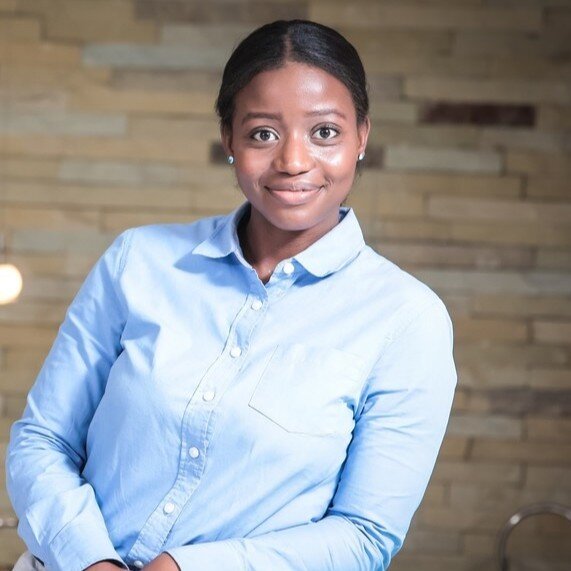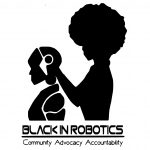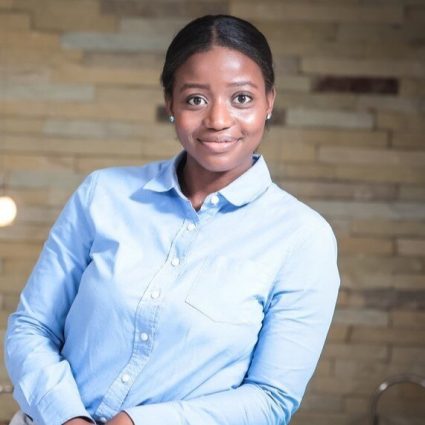
Before droves of people descend on a convention center for a trade show or conference, the hall must be carefully divided up to accommodate corporate show booths, walkways for attendees, spaces for administrators/security and much more. The process of defining the layout and marking it up for construction crews is often done with humans laboriously measuring and marking distances, but Lionel can do all of this for you. Once given a plan, it zooms along empty convention halls while precisely marking all of the dimensions for the schematics that you have in mind.
Lionel, the floor-marking robot, was made specifically for the organizers of trade shows and conferences.
Lionel isn’t a robot that you’d typically think of when you imagine new applications of technology, but it fills a niche that there is strong demand for. Identifying use cases like Lionel’s and showing that there is a robotic solution for them is part of the responsibility of business strategy managers like Vuyo Makhuvha.
Vuyo works in building August Robotics mobile robotics portfolio which at the moment comprises 2 robots. Their latest robot Diego, Disinfection on the Go! Is a mobile UV-C robot design which was released in March 2021. Diego provides hospital-grade disinfection for hotel rooms and public spaces in a way that is safe and easy to use and allows establishments to increase safety and differentiate their hygiene programmes.

Identifying use cases like Lionel’s or Diego’s, and showing that there is a robotic solution for them is part of the responsibility of business strategy managers like Vuyo Makhuvha. Keep reading to see her explanation of how a non-engineer can have a significant impact on robot design, how she managed the experience of leaving her home in South Africa for her new home of Hong Kong, and much more.
Vuyo’s trajectory
Vuyo is a bright mathematical mind from South Africa that had narrowed down her area of study to two subjects when preparing to enter the University of Cape Town (UCT): Engineering and Actuarial Science. In what felt like a gut-wrenching decision, she chose to study Actuarial Science. Unbeknownst to her, she would eventually return to working with engineers in good time.
Vuyo excelled at UCT, eventually earning both a Bachelor’s degree and a Master’s Degree (with a Master’s Thesis)! All the while, her education was enriched by the prestigious Allan Gray Orbis Fellowship, which she had been awarded after graduating high school. The fellowship not only covered her tuition, but also taught her about entrepreneurial thinking as well as placed her amongst a community of like-minded individuals.
And the Fellowship’s support doesn’t end there! “After those four years [with the Allan Gray Orbis Fellowship] you can tap into additional support. For example, if you want to be an entrepreneur, you basically say ‘Hey I want to start a business; Can you help me?” And they’ll have different programs [to support you].’ “
“It’s amazing. It’s one of the experiences that I’ve had that has really encouraged me.”
While getting her Master’s Degree, Vuyo had gotten a taste of the broader world outside of Actuarial Science and decided that she wanted to see more of it by working for a consulting company after she graduated: McKinsey & Company. There, her intention was to “gain exposure to [the] questions that businesses are answering for themselves” and McKinsey was able to give her that exposure. She was placed onto teams where they established “strategies that would grow their revenue by X [or something similarly] for big name companies that you’ve heard of all of your life” or “made certain that a merger went [the way it should have].” This diverse set of experiences was helpful for narrowing down her interests and for increasing her confidence.
“.. What I really took away from [all of that] was that I can do anything. There are a lot of specialized fields … but I can be quite involved in them by answering questions like ‘How do we commercialize this?’ or ‘What features do we need?’”
Her bolstered confidence and passion for commercialization would then carry her across a continent and into her current role at August Robotics. After 2 years at McKinsey, one of which was spent as a consultant in Asia, Vuyo decided she wanted to experience working at an early stage start-up in emerging tech and she happened to find a role on the Alumni network job board.
At that startup, August Robotics, she ended up becoming a Business Strategy Manager, working with a team of highly-experienced engineers and scientists to develop new robotics-based solutions. To describe her role simply, Vuyo explains that “My job every day is to make sure that we’re designing a robot that fulfills our clients’ needs.” This can lead to tension at times, as Vuyo challenges experienced technical experts in their fields.
“I always say that my job as a commercial person is to dream really, really big. Your job as an engineering team is to tell me ‘Woah! Slow down. This is what we can do.’
And if we’re not having that kind of tension, then I’m not doing my job right. Because I need to be the person who can imagine this amazing product for our customers, especially in the first couple of weeks when we’re coming together with the concept.
You’re supposed to say “Woah! We can’t do this right now, let’s pull it back and do this” “Do you really need that feature right now. Isn’t that something we can do far later in the future?”
It’s your job to hold me back.
Otherwise, we’re not going to be able to make new things that our customers never thought of. The tension is there, but it’s a necessary tension. And as long as it’s done in a way that’s professional and respectful, I think it’s good.”
August Robotics has fostered a culture where this tension can be expressed in such a professional and respectful way. It’s one of the reasons that Vuyo loves it there and recommends more passionate Black roboticists join her at August, if possible.
She plans to stay there as long as the culture remains one in which she can freely explore and challenge her peers and herself as they continue to seek out the unique use cases that only a robot can solve in the world. The call of entrepreneurship still lingers in her ear, however, and she plans to one day use the lessons she has learned as an Allan Gray Orbis Fellow to make an impactful business.
Vuyo’s challenges
While she is still relatively new in her current role at August Robotics, Vuyo has overcome several challenges that she thinks others could learn from. Her transition from McKinsey and Company to August Robotics required a transition from her native Africa to Hong Kong. There she went from being in a majority South African context to being in a majority Asian context.
“I think being a Black person in any place that is not predominantly black is always going to be different. Especially in a place like Asia, where there’s so few of us. Yeah, I get stared at [but] it’s not a malicious thing most of the time. I think that most of the time it’s just like: ‘Hm. Why are you here?’”
To overcome the challenge of feeling isolated, she learned to embrace the feeling of benign curiosity coming from her new neighbors. The feeling inspired Vuyo to make an unwritten rule: “Every time I see a black person, I always say hi to them…. I can go through a whole day without seeing another black person. It’s weird. So, [I] just have to acknowledge that we’re both in this whenever I see them.”
Vuyo’s words of wisdom
Vuyo repeatedly expressed how valuable it is to work in an environment as supportive as the one that she has found in August Robotics and recommends that you look for:
“[a place] where you trust the people that you work with, you feel like people respect and trust you, and … you never feel weird about not knowing something. Because then you operate from a place of stability or comfort. Of course, I’m going to work really really hard; I don’t want to do anything wrong and I’m going to be really really careful.
I do it not because I’m in fear about what the repercussions will be. I do it because I’m comfortable enough that I can contribute to what our team is doing, and that I feel that responsibility to contribute and to make our team successful. And so I don’t spend time worrying about things that I don’t need to be worrying about. I spend time worrying about the [robotics] problems that we have.”
Finding and contributing to an environment like that is what has allowed Vuyo to thrive and is what she plans to foster in every organization she works at (or starts!) in the future.
Finally, Vuyo’s advice to young people interested in robotics (from the commercial side or not) is:
“To continue to be driven by what [you] think is interesting and exciting and stimulating, and to not for a second think that [you’re] not capable or not worthy.
Because [you] have to try stuff and not get in your own way. Just believe that you’re good. That you have creative and exciting ideas and then go and apply that creativity to things that you find interesting and exciting.”
More from Vuyo
Feel free to follow August Robotics to find out more about the products Vuyo is helping to launch!
Feel free to connect to Vuyo via LinkedIn.
Acknowledgements
Drafts of this article were corrected and improved by Vuyo Makhuvha, Sophia Williams, and Nailah Seale. All current errors are the fault of Kwesi Rutledge. Please reach out to him if you spot any!

Black In Robotics
addresses the systemic inequities found in our robotics community by focusing on three primary pillars – community, advocacy, and accountability.

Black In Robotics
addresses the systemic inequities found in our robotics community by focusing on three primary pillars – community, advocacy, and accountability.
Credit: Source link


Comments are closed.